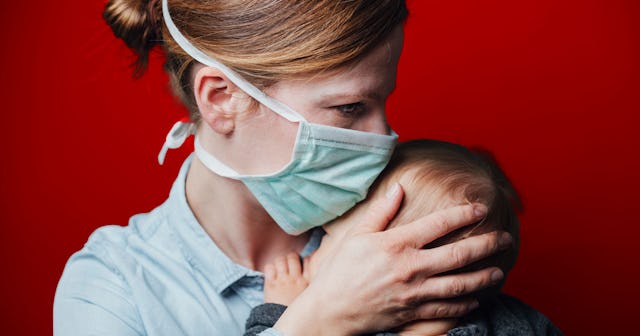My Baby Had Pneumonia And RSV — And It Was Terrifying

Nothing good happens at 4:00am. The sun is down and the moon is high. Bars are closed and traffic is non-existent, and that is because most individuals are asleep. It’s quiet, and dark, and it should be an uneventful hour. And yet a few weeks ago it was anything but, at least in my house. Why? Because at 4:00am I woke to the sounds of my son coughing and choking, wheezing and gasping for air.
I ran to his room quickly, hurriedly. I deftly navigated his nursery in the dark, and when I entered, I found him standing up crying. “Mama,” he whined. “Mama.” I scooped him up, his little body burning my forearms through his outfit. He had a fever of 104. I held him and rubbed his back, trying to calm him so his tears didn’t exacerbate his condition. I rummaged in the dark for Tylenol and woke my husband.
“Something is wrong,” I said. “This is more than a daycare cold.” And upon seeing my son and listening to his breathing he agreed. We called the doctor first thing in the morning. And after a smattering of tests — and 24 hours — we got the results we expected: Our son had respiratory syncytial virus, or RSV.
“Respiratory syncytial (sin-SISH-uhl) virus, or RSV, is a common respiratory virus that usually causes mild, cold-like symptoms,” the Centers for Disease Control and Prevention explains. “Most people recover in a week or two, but RSV can be serious, especially for infants and older adults.” Why? Because there is no medication for RSV. Two-year-olds are too young for a cough or cold prescriptions, and antibiotics won’t help. The viral infection simply has to run its course. But the course of his illness was unpredictable, at best. Even with Tylenol, ibuprofen, a humidifier, and regular baths, he seemed to be getting worse. His breathing remained labored. His cough, which was (already) steady and consistent, became persistent. It was relentless, and his fever remained elevated. I couldn’t get it to break.
Admittedly, I was scared. For nearly a week, I slept on his floor — or with his little body laying atop mine. This isn’t right, I thought. Something’s not right. And so I took him back to the doctor, where they looked in his ears again and down his throat. They palpated his glands and felt his abdomen, and then they listened to his breathing. For a good while, his doctor just listened. And while she didn’t say anything — neither did I — my gut told me everything I needed to know.
realPHOTO/Getty
“It sounds like there’s a little rattle in the right side of his chest,” she said. “You should take him for an X-ray. Stat.”
My legs shook. My heart dropped, but I nodded. “Will they take him today?” I said, looking at my watch. It was 4 o’clock.
“Definitely,” she said. “We will have the results within hours.”
“OK,” I said, before packing him back into his stroller and leaving the office. OK, I thought, before calling my husband and delivering the news. OK. Everything will be okay. But okay is, of course, subjective — and having a toddler with pneumonia (yes, really) isn’t ideal. It is scarier than you’d imagine.
“Pneumonia is an infection of the lungs,” an article on Kids Health explains. “Normally, the small sacs in the lungs are filled with air. In someone who has pneumonia, the air sacs fill up with pus and other fluid.” And this was happening to my toddler, my sweet, gentle, and loving little boy.
“Viruses, like the flu or RSV (respiratory syncytial virus), cause most cases of pneumonia,” Kids Health continues. “[However,] less often, bacteria can cause pneumonia.”
Like my son, one of the first warning signs that an illness is RSV is when a child has trouble drawing a clear breath. “Look for fast breathing, pushing the belly in and out, or flaring the nostrils — signs your baby is struggling to breathe,” advises WebMD. Good hygiene is the only way to prevent it, and if your child does have RSV, they will be contagious from three to eight days. And, also like my son, more susceptible to pneumonia.
The good news is that, with this diagnosis, we were able to begin treatment. My son was prescribed antibiotics, and he began to settle. His cough lessened. After 10 days, we were finally able to get his fever to break. But the seriousness of his condition is not lost on me. For days, I was sure he would end up in the hospital — with oxygen and monitors. I imagined there would be sponge baths, wires, masks, and tubes. And this thought of this terrified me.
It’s been three weeks and I’m still shook. But I’m so glad I listened to my gut — and to his breathing and body — and stayed in contact with his doctors. During the week, I made half a dozen phone calls, and I learned as much as I could about each condition because that’s what I do. When nervous, I read and do research. I take stock of that which I can control, and it helped. Because every parent should know about RSV. As its peak season approaches, every person should be aware of this potentially dangerous respiratory condition.
This article was originally published on